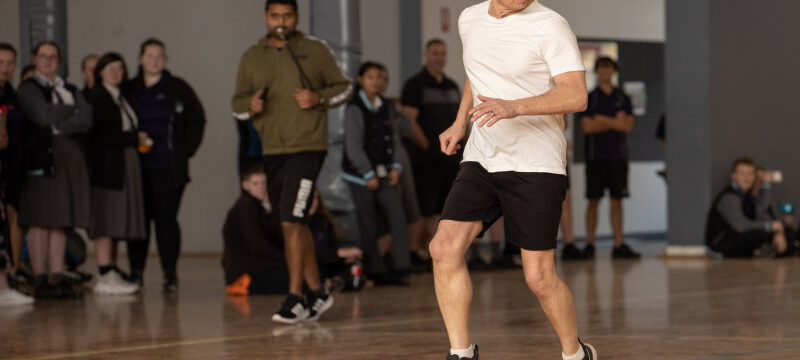Save articles for later
Add articles to your saved list and come back to them any time.
It’s Monday lunchtime and McClelland College Year 12 students are squaring off against their teachers.
There’s a lot at stake. At the Frankston public school, students and staff battle it out weekly in everything from chess to footy. Last week, the teachers won at trivia (meaning they are inching ahead in the tally for the year). But this week, it’s soccer.
McClelland College students Will Coburn and Campbell Zach in the school shed building work to sell at market – and fundraise for a fun student excursion.Credit: Simon Schluter
“I may pull a hammy,” warns principal Amadeo Ferra as he races off to change out of his suit into shorts for the game. “But we have to defend our win. There will be no mercy.”
VCE coordinator Andrew Hemsley recently lost his record in the food-eating competition to a student. “Fastest to eat a whole lettuce,” he explains.
But he’s been known to betray his own side to help the kids take home the trophy at the end of the year. “This is all about making them want to come to school,” says Hemsley. “Having some fun together, students and teachers, and building those relationships.”
It’s good team building for staff too, says Ferra. When he first arrived at McClelland in 2006, the median VCE study score was 25.6. “And no one really had any pride in the school, not even the teachers.”
Today, that median score has risen to 30, and the percentage of students with study scores of 40 or above is now 4.8 (up from 1.9 in 2016). Those climbing results are why The Age has named McClelland its 2023 Schools that Excel winner for government schools in Melbourne’s south.
The annual series celebrates schools that achieve outstanding advancement in their VCE results. The Age has gathered VCE results data going back 10 years for every secondary school in the state and turned it into an easy-to-use dashboard to show how each one fared over the past decade, what its graduates do after finishing, and more.
At McClelland, teachers are now sending their own kids to the college – “the real test of a school,” says Ferra. (His brood of four will eventually all graduate in the McClelland colours, too.)
Principal Amadeo Ferra joined teachers squaring off with students for their weekly contest.Credit: Simon Schluter
The school’s catchment zone takes in some of the most disadvantaged parts of Melbourne’s south. And it works hard to keep students in school, through a vocational major, extended university subjects, or tailored programs for kids disengaging, including outreach off-campus or woodworking and landscaping projects around the school.
While McClelland may have a healthy underdog mentality, Ferra says it also sets high academic ambitions for students.
He recalls a Year 7 student whose NAPLAN results revealed she was already at Year 10 level for maths. “So I said ‘why isn’t she starting VCE maths next year?’, and everyone laughed, but I spoke to her parents and her teachers and the next year she was top of that year 11 class. The next, she got pipped, she’d sparked some competition.
“Our kids may not have expensive tutors or elite sports training every morning, but they can do extraordinary things.”
He admits he was tired of losing students to other schools with exclusive accelerated programs when he set one up for McClelland. “Parents would always ask at open nights: ‘do you have a science academy, a sports academy?’. We opened one, but to all our students.”
Balcombe Grammar principal Ross Patterson with students Isla, Lucy, Niamh, Maisy, Millie and Sam, with therapy dog Maurice in the library.Credit: Penny Stephens
They spend half their Wednesday on a dedicated passion, forming groups around different interests – from cooking to robotics.
“Wednesday, ‘hump day’, used to be our worst day for attendance,” Ferra says. “Now it’s the best.”
Further down the peninsula at Balcombe Grammar, busy school corridors part at once when principal Ross Patterson strolls into view. But not for the reason people might expect.
“I’m legally blind,” he explains, “I have a degenerative eye condition and this is the first school I ever felt comfortable sharing that. Now people step aside to look after me, they make sure I don’t bang into anything.”
He credits Balcombe’s VCE result success to the school’s strong sense of community. The private school’s median study score is now 32, with 11.3 per cent of students scoring 40 or above, up from 3.1 per cent in 2020, and making Balcombe The Age’s 2023 Schools That Excel winner for southern non-government schools.
Since the Christian school was founded 16 years ago, it has grown from 30 students to more than 960, almost at capacity.
Patterson arrived at the school in 2019 and has made student wellbeing central, expanding support even further since the pandemic, along with community service and co-curricular programs.
“Students made care packages for the Monash Children’s Hospital, for example, because we had some with friends or family there,” he says.
Balcombe Grammar principal Ross Patterson with students (left to right) Massimo, Emmerson, Kobi, Annali, Sophie and Indigo in their marketplace cafe.Credit: Penny Stephens
“In Year 9, they’ll hold a pop-up market where they have to design a product, come up with a business model, then showcase it to the community.”
Locals are invited to wander between market stalls at the school’s custom-built marketplace and cafe to hear elevator pitches. In 2021, two students (and sisters) launched a successful skincare range One Summer from the school marketplace.
“That kind of experience, not just of success, but failure too, means by the time they get to year 12 they’re more resilient,” says Patterson. “And they’re braver.”
The Morning Edition newsletter is our guide to the day’s most important and interesting stories, analysis and insights. Sign up here.
Most Viewed in Politics
From our partners
Source: Read Full Article




